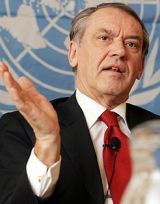Delay in Darfur force harming peace process
December 3, 2007 (BRUSSELS) — Delays in deploying a joint U.N.-African Union force in Darfur are undermining efforts to negotiate a peace agreement for the Sudanese region, the U.N’s mediator Jan Eliasson said.
 Eliasson was speaking to Reuters before a tour of the region to sound out governments and rebels on when talks could resume.
Eliasson was speaking to Reuters before a tour of the region to sound out governments and rebels on when talks could resume.
A plan to deploy 26,000 soldiers and police by year-end was months behind schedule and having a force of 9,500 in place by then was the best case scenario, the military head of the mission said last week.
“As political negotiators we also need progress on the peacekeeping side,” said Eliasson, the former Swedish foreign minister, adding that the struggling AU mission of almost 7,000 personnel was not enough to monitor a cessation of hostilities.
“We want to have a minimum presence on the ground to improve the situation … and also to monitor the cessation of hostilities agreement which we hope will come about at the beginning of the substantive talks,” he said in an interview.
“If we don’t have enough troops on the ground we cannot monitor, we cannot verify possible breaches of that agreement, so we are disturbed by the delay,” he said.
The AU force has failed to halt a conflict which the U.N. estimates has killed 200,000 in a humanitarian crisis and forced 2.5 million from their homes.
A first round of peace talks between the government and the rebels, held in Libya in October, fell into disarray when the most significant rebel groups refused to attend, saying they needed more time to prepare their positions.
Eliasson, tasked with AU envoy Salim Ahmed Salim to broker the talks, said he would sound out Egypt, Eritrea, Chad and Libya on Tuesday in Egypt, and then travel to Khartoum and Darfur to consult rebels and the government.
“We have expectations both on the (rebel) movements to unify their positions and decide on negotiation teams, but also of course on the government to prepare themselves for the talks as a government of national unity,” he said.
Asked when new talks could take place, he said he would reach a conclusion after the forthcoming round of contacts with the government and the rebels.
(Reuters)
